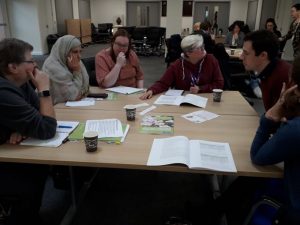In our latest Think-Piece, Olivia Bridger, recent Geography Graduate and Ruth Evans, Participation Lab Leader, reflect on our discussions with statutory, voluntary and community sector representatives about the recommendations of the Participation Lab’s report, Tackling Loneliness and Social Isolation in Reading.

The report was launched on 17th October 2019 at an extraordinary meeting of the Loneliness and Social Isolation Multi-Agency Steering Group, convened by Reading Borough Council’s Health and Wellbeing Team. Following our presentation of the key findings, participants split into smaller groups to how discuss the report’s seven recommendations could be taken forward as part of the Steering Group’s Action Plan. The report recommendations are:
- Raising awareness about loneliness and social isolation and links to health and wellbeing among statutory and voluntary and community sector service providers, employers, schools, members of the public
- Greater provision of specialist support services for groups at risk of loneliness and social isolation, encompassing tailored one-to-one support, as well as group activities, with increased opening hours, particularly at weekends
- More collaborative working between organisations, and Reading Borough Council, ‘joined-up’ thinking and signposting
- Increasing the affordability and social accessibility of transport, including through concessionary fares, building people’s confidence, supporting and raising awareness about alternative transport services for people with complex needs and carers, such as ReadiBus and neighbourhood volunteer transport initiatives
- Developing peer support, befriending and volunteering schemes
- Fostering good neighbourliness, faith communities and community development
- More accessible information, communication and promotion of activities and services in appropriate formats.
Participants engaged in enthusiastic discussions and drew attention to a number of important points. Firstly, participants highlighted the importance of avoiding stigmatising language within specialist support services and befriending schemes. This was due to negative perceptions associated with loneliness. For example, it was suggested that when promoting activities and events, the word ‘loneliness’ should be avoided. Instead, people could be asked if they wanted to volunteer and participate in activities.
Similarly, while carrying out evaluation activities, one participant suggested instead of directly asking individuals whether such activities alleviated feelings of loneliness, practitioners should ask whether activities or support enabled them to spend meaningful time with others or develop new friendships. Similarly, several participants emphasised the importance of ensuring that service providers or organisations did not assume that because an individual may fit within a certain demographic profile, that they must experience loneliness.
With regard to our second and third recommendations, the role of the voluntary and community sector who provide specialist services was seen as crucial in addressing diverse needs. Participants praised the work of Reading Voluntary Action (RVA), an umbrella organisation, because of their links and support provided to smaller, grassroots organisations who are often more effective at tackling diverse needs and community issues. The Reading Directory of Organisations was pointed to as a good resource that could help organisations to signpost onto other local services.
However, support for more joined-up service provision was identified, with greater signposting between different specialist services needed to address intersecting inequalities, such as people who identify as LGBTQ+ and have autism or who are refugees. Some participants identified a need for a specialist team to work with all the smaller organisations and listen to all the diverse needs being identified, rather than simply providing services based on perceptions of what people want. Some participants also identified a need for more support and training in preparing funding applications to secure funding for specialist services.

When discussing Recommendations 2 and 6, participants also highlighted the importance of less specialised services in providing more general support to meet people’s basic needs, including Health and Social Care, which should not be overlooked. Indeed, encouraging good neighbourliness, promoting social connections and self-esteem will never be a priority if, for whatever ever reason, people’s physiological needs of food, shelter, secure income and care are not met.
With regard to our fifth recommendation, participants identified a ‘volunteer gap’ which could represent a significant barrier to developing peer support, befriending and volunteering schemes. One participant recalled her experience of how paid staff are essential. In her experience, when an organisation is comprised entirely of part-time volunteers, often more time is spent “worrying about who is going to put out the chairs” at events or meetings, rather than focusing on the fundamental issues to be addressed, such as alleviating loneliness.
One participant pointed out one solution to this ‘volunteer gap’ may be engaging with the private sector. Many businesses are looking to become more socially engaged and community-focused, and could offer employees ‘volunteer days’ to support local charities. Yet, it was recognised that this may not provide the long-term support that is required. Involving the private sector involvement could help to provide professional skills in demand by third sector organisations, such as marketing and communications and advice on how to best promote services and events to different audiences.
A key point of discussion surrounding Recommendations 3 and 7 was that it was not lack of services necessarily that hindered progress, but a lack of knowledge about what services exist amongst both the public and other organisations. Accessibility of information was a crucial issue for Deaf and hearing impaired people, as well as refugees and and other speakers for whom English is not the first language. Concern was identified about the availability of interpretation and translation services and a need to make people more aware of how they could access these from the council and at local level.
We look forward to seeing how our recommendations are taken forward in the review of the Multi-agency Steering Group’s Action Plan.

